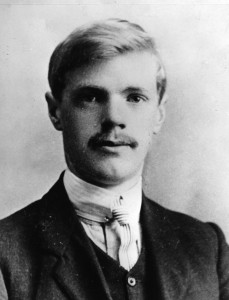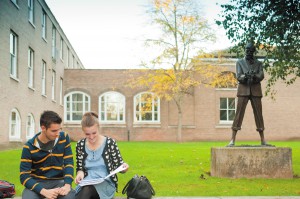May 11, 2016, by Liz Cass
DH Lawrence: Why we pay tribute to the man who valued education
D. H. Lawrence is often named as Nottingham’s most prominent literary figure. From his birth in the small mining village of Eastwood in 1885 to attending University College, Nottingham (now the University of Nottingham) from 1906-08, it is fair to say that Lawrence’s literary imagination was shaped by the area and its lively culture.
He certainly fictionalised specific areas of Nottinghamshire and Derbyshire, and used many of the people he knew as characters in his work. One of the most important things that Lawrence brought to literature was his (often autobiographical) portrayal of working-class experience.  Lawrence was fascinated by the interactions between people, and he portrayed intimacy in relationships in ways that risked offending the reading public. He is notorious for the 1960 Penguin Books obscenity trial of his final novel Lady Chatterley’s Lover (1928), which had been banned from sale in Britain due to its outspoken sexual content. Following the trial, readers were finally able to buy the book in a full unexpurgated edition, and Lawrence gained the attention of a new generation of readers. It is less widely known that the first of his books to be recalled from sale was The Rainbow in 1915, which damaged his reputation and made publishers wary of his work.
Lawrence was fascinated by the interactions between people, and he portrayed intimacy in relationships in ways that risked offending the reading public. He is notorious for the 1960 Penguin Books obscenity trial of his final novel Lady Chatterley’s Lover (1928), which had been banned from sale in Britain due to its outspoken sexual content. Following the trial, readers were finally able to buy the book in a full unexpurgated edition, and Lawrence gained the attention of a new generation of readers. It is less widely known that the first of his books to be recalled from sale was The Rainbow in 1915, which damaged his reputation and made publishers wary of his work.
Lawrence had a fascinating life, and has been the subject of many biographies and memoirs since his tragically early death from tuberculosis in 1930, at the age of 44. He spent over half of his life in England, but after meeting his future wife Frieda Weekley (née von Richthofen) in March 1912, the couple travelled extensively. They lived in Germany, Italy, Australia, New Mexico, Mexico, Majorca and France, and visited many other places, including Ceylon (current-day Sri Lanka).
The University of Nottingham commemorated Lawrence’s achievement and significance for the city in 1994 with a life-sized bronze statue of him, which can be seen outside the Law and Social Sciences Building at University Park campus. The award-winning D. H. Lawrence Pavilion at Lakeside Arts Centre opened in 2001.
As well as a thriving D. H. Lawrence Research Centre within the School of English, Manuscripts and Special Collections at the University can boast that it holds the best collection of Lawrence’s early work anywhere in the world. Lawrence is now set to be commemorated at Ningbo campus.
On Thursday 12 May, the UK Ambassador to China, Barbara Woodward, will visit The University of Nottingham Ningbo to officially open a new auditorium, which will be named the D. H. Lawrence Auditorium. It will be another fitting tribute to a man who valued education and had such close links to the University.
Annalise Grice, PhD Researcher, School of English, University of Nottingham
No comments yet, fill out a comment to be the first


Leave a Reply